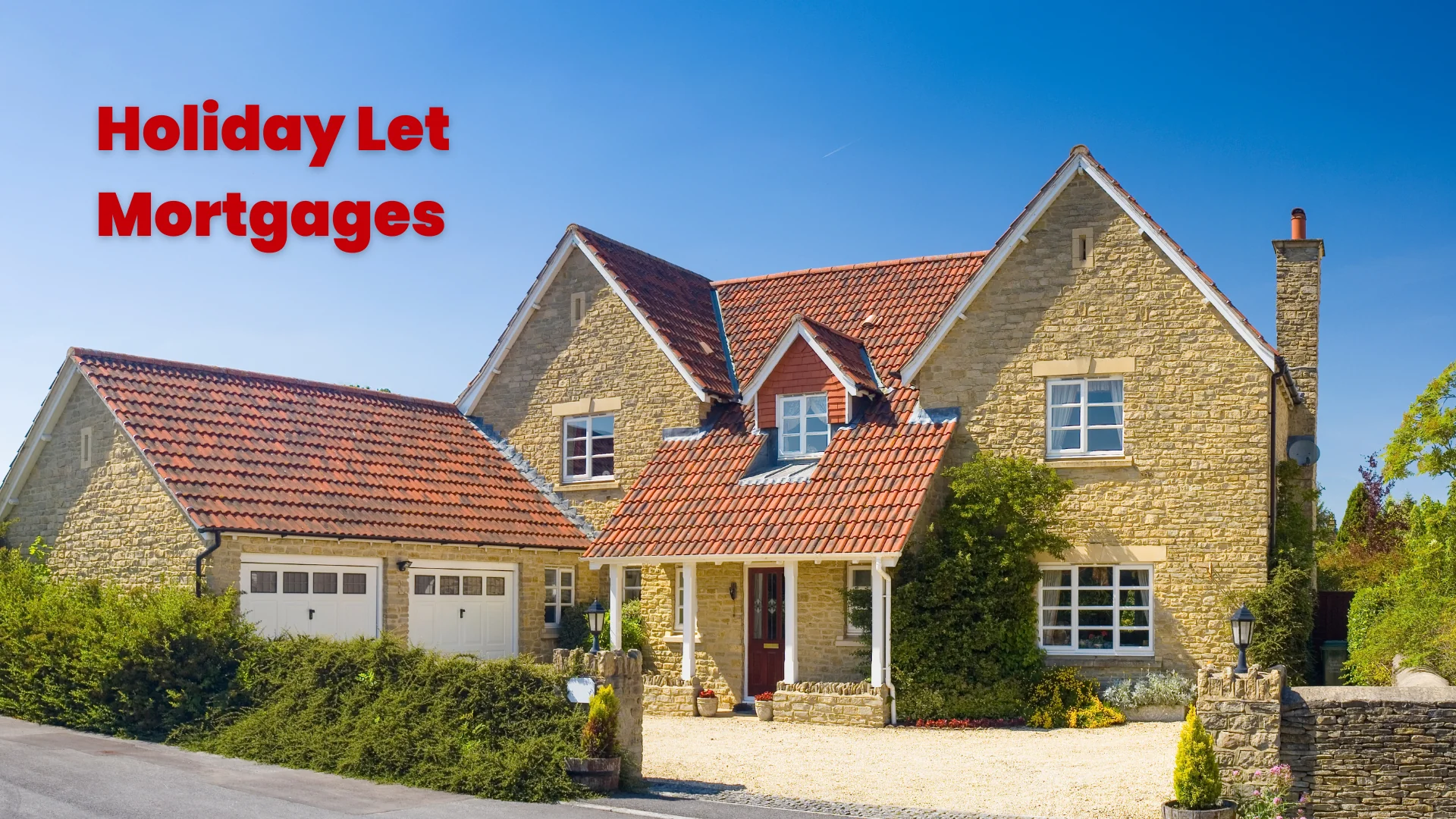- How To Finance A Holiday Let?
- Is A Holiday Let Mortgage Different From Buy-To Let?
- Is A Holiday Let A Good Investment?
- Holiday Let Mortgage Criteria
- How Much Can I Borrow?
- Can You Afford All The Costs?
- What Are The Taxes?
- Which Lenders Offer Holiday Let Mortgages?
- How To Apply For A Holiday Let Mortgage?
- Alternatives To Holiday Let Mortgages
- Key Takeaways
- The Bottom Line
Holiday Let Mortgages: What You Need To Know

Have you ever dreamt of owning a cosy cottage by the sea or a charming lakefront cabin? Not just for personal enjoyment, but to generate income by renting it out to holidaymakers?
Holiday lets offer a unique investment opportunity, but financing them can be different from regular mortgages.
Here’s a complete guide to get you started in the UK:
How To Finance A Holiday Let?
When thinking about buying a holiday let, the first question is usually about financing. One of the most common ways is through a mortgage.
A holiday let mortgage is designed for properties rented out short-term to tourists. Unlike regular mortgages, they consider the potential income from your holiday renters.
This type of mortgage can be a bit different from what you’re used to, as it takes into account the unique nature of holiday letting.
Is A Holiday Let Mortgage Different From Buy-To Let?
Yes, a holiday let mortgage is quite different from a buy-to-let mortgage, and here’s why. Both are for properties you intend to rent out, but the similarities end there.
Holiday Let Mortgages
These are for short-term rentals to tourists. Income from holiday lets can vary due to seasonality, which lenders take into account. Notably, you can charge higher rates during peak seasons.
For tax benefits, you can offset mortgage interest against rental income, provided your property is available for rent for at least 210 days and actually rented out for 105 days per year.
Buy-To-Let Mortgages
These cater to longer-term leases and offer more stable income based on monthly rent.
However, recent tax changes mean you can’t deduct all your mortgage interest from rental income; instead, you receive a 20% tax credit.
Choosing between the two boils down to how you plan to rent out your property.
If you’re aiming for short, touristy lets, a holiday let mortgage is your go-to. For longer-term rentals, a buy-to-let mortgage would suit you better.
Is A Holiday Let A Good Investment?
Holiday lets are increasingly popular. With travel trends shifting towards local holidays, many property owners are seeing high demand.
With an average occupancy rate of 32%, according to Sykes Cottages. This rate might be higher in popular spots.
If you’re undecided, here’s an overview of the pros and cons to help you decide:
Pros
- High Potential Income. Peak season rates can significantly exceed standard rental incomes.
- Tax Benefits. Specific tax advantages apply to furnished holiday lets.
- Personal Use. You can enjoy your property when it’s not let out.
Cons
- Seasonality. Income can fluctuate with the seasons, impacting cash flow.
- Maintenance. Higher guest turnover can lead to more wear and tear.
- Management. Requires active management, especially during high season.
Holiday Let Mortgage Criteria
If you’re considering a holiday let mortgage, here’s what you need to qualify:
- A minimum deposit, usually 25% of the property’s value.
- Proof of personal income, often above £25,000 annually.
- Potential rental income covering around 125% to 145% of your mortgage payments.
- Good credit history to show lenders you’re reliable.
- Experience in property letting can be beneficial but not always necessary.
- The property must be in the UK and suitable for holiday letting.
- Some lenders require you to earn a certain amount from the holiday let annually.
Different lenders have varying criteria. So it’s important to check carefully with the lender or consult a broker to learn about all the requirements for a holiday let mortgage.
How Much Can I Borrow?
Lenders offer at least 75% loan-to-value for holiday-let mortgages. Loan-to-value is the percentage of your mortgage loan against the property value.
To put it into perspective, for a property worth £100,000, you can borrow at least £75,000 [£100,000 x 75%]. This means you need to cover for the 25% deposit. The larger your deposit, the more access you have to cheaper deals and better terms.
Additionally, your rental yield–the percentage of return you get on a rental property each year. This is the money the rent brings in compared to how much the property costs.
The higher the rental yield, the more return you’re getting annually.
In the UK, your rental income from your holiday let should cover at least 125% to 145% of your mortgage repayments.
Lenders calculate this by estimating your yearly income from both peak and off-peak seasons.
For example, if you rent your property at £500 a week for 20 weeks, you’d make £10,000 a year. If your monthly mortgage payment is £500, the annual cost is £6,000.
For your rental income to cover 125% of this, you’d need to make at least £7,500 a year from renting out your property (£6,000 x 125% = £7,500).
In this scenario, your £10,000 income from holiday letting exceeds this requirement, illustrating a good yield.
This means that your lender might be more willing to offer a larger loan. Your income, credit history, and the property you’re eyeing also play a factor in your borrowing amount.
For a ballpark figure, use the holiday let mortgage calculator.
But for the most accurate figure, talking to a mortgage broker is your best bet. They can give you tailored advice based on your situation.
Can You Afford All The Costs?
Before jumping into holiday letting, it’s wise to understand all the costs involved. Here’s what you’ll need to consider:
- Deposit Size. Typically, you’ll need at least a 25% deposit of the property’s value for a holiday let mortgage.
- Mortgage Repayments. These will vary based on your loan amount and interest rate. Keep an eye on market rates to get the best deal.
- Mortgage Fees. Expect arrangement fees for your mortgage, valuation fees, and legal costs. These fees range from £500 – £2,499.
- Letting Agents. If you choose to use a letting agent, their fees can range from 10% to 20% of your rental income.
- Maintenance Costs. Regular upkeep and emergency repairs can add up. Setting aside a maintenance fund is a good idea.
- Utility Bills. Unless you pass these costs onto your guests, you’ll be responsible for utility bills, including water, electricity, and internet.
- Insurance. Specialised holiday let insurance is a must to cover both the property and your business activities. This may cost between £500 – £1,000 annually, depending on coverage levels.
- Furnishings and Equipment. To attract guests, your property must be well-furnished and equipped, which requires an initial investment and ongoing updates.
- Marketing. Listing your property on rental platforms comes with fees, and effective marketing might involve additional costs for professional photos or website maintenance.
- Taxes. You’ll need to pay income tax on your rental earnings. Also, consider council tax and, if applicable, business rates.
What Are The Taxes?
Owning a holiday let in the UK means dealing with various taxes. Here’s a rundown to help you understand what to expect.
Income Taxes on Holiday Let Earnings
You must declare the income you earn from your holiday let to HMRC. This income is subject to income tax, just like your regular earnings. The rate you pay depends on your total taxable income.
Capital Gains Tax
When you sell your holiday let, you might need to pay Capital Gains Tax on the profit. The current rates are 18% for basic rate taxpayers and 24% for higher or additional rate taxpayers on residential property gains.
Tax reliefs are available, but it’s wise to get advice tailored to your situation.
Stamp Duty Taxes
Buying a holiday let means paying Stamp Duty Land Tax. If it’s an additional property, a higher rate applies, usually 5% on top of the standard rates.
Second Home Council Tax
Your holiday let might be subject to council tax. For second homes, some councils offer a discount, while others charge up to a 100% premium. If your holiday let is available for rent for at least 140 days a year, it might be rated for business rates, which could be more advantageous.
Impact of the 2024 Spring Budget Changes
The 2024 Spring Budget announced changes affecting how furnished holiday lettings are taxed, aligning them more with buy-to-let properties from April 2025. It’s essential to stay informed about these updates.
Which Lenders Offer Holiday Let Mortgages?
Here’s a list to get you started:
- The Cumberland
- Holiday Cottage Mortgages
- Leeds Building Society
- Furness Building Society
- Monmouthshire Building Society
- Bath Building Society
- Hodge Bank
- Specialist holiday let mortgage brokers
- Together Money
- Lloyds Bank
- Market Harborough Building Society
- Principality Building Society
- Marsden Building Society
- Yorkshire Building Society
- Suffolk Building Society
Each lender has different criteria and offers various deals, so it’s wise to shop around or speak to a mortgage broker.
A good mortgage broker can help match you with the best mortgage for your needs and improve your chances of a successful application.
How To Apply For A Holiday Let Mortgage?
The best way to apply for a holiday let mortgage is to talk to a reputable mortgage broker. Brokers have access to a wide range of deals, some of which aren’t directly available to the public.
They can also provide valuable advice tailored to your specific needs and help you navigate the application process.
To provide more clarity, let’s use an example with figures. Say you’re looking at a holiday let valued at £250,000. You’ll likely need a 25% deposit, which is £62,500.
Here’s how the process works:
1. Initial Consultation
Arrange a meeting or a call with your chosen broker. If you opted for an online mortgage broker, your first interaction will likely be a virtual meeting or an online questionnaire.
You’ll share details about your financial situation, investment goals, and what you’re looking for in a holiday let.
2. Document Gathering
Your broker will tell you which documents you need to provide.
Typically, this includes proof of income, bank statements, identification, and details of your financial commitments.
For online applications, you’ll need to upload this in your broker’s website or app.
3. Mortgage Assessment
The broker assesses your financial situation to determine how much you can borrow and what products might be suitable.
They’ll consider your income, outgoings, and the potential rental income from the holiday let.
4. Property Search
With an idea of your budget, you start looking for a suitable holiday let property. Let’s say you find a charming cottage listed at £250,000.
Your broker can advise on locations and properties that are likely to meet lender criteria.
5. Mortgage Application
Once you’ve found a property, your broker will help you complete the mortgage application. They’ll ensure all the information is accurate and present your case to the lender in the best possible light.
6. Property Valuation
The lender organises a valuation to check the property’s value and suitability for holiday letting. This is often done remotely or through local agents.
You might incur at least £400 property valuation fee.
7. Mortgage Offer
If the application is successful, the lender will issue a mortgage offer. This outlines the terms of your mortgage, including the interest rate and repayment period.
For our scenario, this would be based on borrowing £187,500, with an interest rate of 3.5% over 25 years, resulting in approximately £940 monthly repayments.
8. Legal Process
You’ll need a solicitor or conveyancer to handle the legal side of the property purchase. Your broker can often recommend someone if you don’t have one. This may cost around £1,500.
9. Completion
Once the legal process is complete, you’ll exchange contracts with the seller. The mortgage funds are transferred to complete the purchase, and you become the owner of the holiday let.
For online applications, digital signatures and online document management make the exchange and completion process quicker. The purchase is completed when funds are transferred.
10. Set Up Your Holiday Let
Now you can prepare your property for guests. This might involve furnishing, setting up utility bills, and creating listings on holiday rental sites.
Summary of Costs
Here’s a quick overview of the costs involved in this scenario:
| Cost Type | Amount (£) |
|---|---|
| Purchase Price | £ 250,000 |
| Deposit (25%) | 62,500 |
| Mortgage Amount (75% LTV) | 187,500 |
| Interest Rate (approx.) | 3.5% |
| Monthly Mortgage Repayment (25 years) | ~940 |
| Arrangement Fee | 1,599 |
| Valuation Fee | 400 |
| Legal Fees | 1,500 |
| Furnishing | 5,000 |
| Total Initial Costs (Deposit + Arrangement Fee + Valuation Fee + Legal Fee + Furnishing) | £ 70,999 |
Remember, this is a simplified scenario. Actual costs can vary, especially when considering additional expenses like stamp duty, insurance, and maintenance for your holiday let.
Your broker will guide you through each step, ensuring you understand the costs and commitments involved.
Alternatives To Holiday Let Mortgages
Mortgages are not the only way to finance your holiday let. Here are some other options you have:
- Savings or Cash Purchase. Using your savings to buy outright means no debt or interest payments. It’s straightforward but requires significant upfront capital.
- Remortgaging Your Main Home. If you have enough equity in your primary residence, you could remortgage to release funds for your holiday let purchase. This option could offer lower interest rates than a holiday let mortgage.
- Secured Loans. Also known as a second charge mortgage, can be taken out against your existing property. This can be a flexible way to raise funds, but it does put your property at risk if you can’t keep up with repayments.
- Bridging Loans. For short-term finance, bridging loans can fill the gap. They’re useful if you plan to sell the property quickly or refinance. However, they often come with high-interest rates and fees.
Key Takeaways
- Holiday let mortgages are made for short-term rental properties, with lenders focusing on your potential rental income instead of traditional rent agreements.
- Unlike buy-to-let mortgages, holiday lets offer seasonal income, tax perks, and flexibility for personal use—but they also come with more work and fluctuating earnings.
- These properties can bring in great money during busy seasons, but higher maintenance and management needs can be a downside.
- To get a holiday let mortgage, you’ll usually need a 25% deposit, an annual income of £25,000 or more, and a decent credit score. Some lenders might ask for proof your property will bring in enough rental income.
- If a holiday let mortgage isn’t for you, options like using savings, remortgaging your home, or taking out a secured loan could work instead, depending on your finances.
The Bottom Line
In a nutshell, a holiday let is a property you buy to rent out to tourists, offering the chance to earn income and potentially enjoy the property yourself.
Before diving in, consider these key questions.
- Can I afford the initial investment and ongoing costs?
- What’s the potential income, and does it outweigh the expenses?
- How will changes in tourism or regulations affect my holiday let?
A mortgage broker can help answer these and provide clarity on financing your holiday let investment. They’ll offer expert advice, find competitive deals, and save you time by handling the application process.
Thinking about investing in a holiday let? Get in touch with us, and we’ll connect you with a skilled mortgage broker specialising in holiday let mortgage.
Get Matched With Your Dream Mortgage Advisor...

Frequently asked questions
How many holiday lets can I have in the UK?
You can have multiple holiday lets. The limit depends on your financial situation and the lender’s criteria.
Can I let my property on Airbnb with a holiday-let mortgage?
Yes, you can list your property on Airbnb with a holiday let mortgage, but check your lender’s terms to make sure it’s allowed.
Can I get a mortgage for a holiday let for an overseas property?
Getting a mortgage for an overseas holiday let is possible but can be more complex. In the UK, lenders might have specific products or you might need to look at local lenders abroad.
What’s the difference between a holiday let mortgage and a holiday home mortgage?
A holiday let mortgage is for properties rented out short term to tourists. A holiday home mortgage is for properties used personally, not rented out.
Can I holiday-let my house with a mortgage?
You can, but you might need permission from your current mortgage lender or to switch to a holiday let mortgage.
Can I get an interest-only holiday let mortgage?
Yes, in fact many investors opt for interest-only mortgages to lower their monthly payments. It’s best to connect with a broker to find lenders offering this repayment type of mortgage.
How much money can I make from a holiday let?
Your earnings from a holiday let can vary widely.
On average, they’re booked for 20 to 24 weeks a year, but popular ones can exceed 40 weeks. Thanks to a surge in UK staycations, demand is high.
In peak season, you might earn as much in a week as you would in a month from a standard rental. Some landlords earn up to 30% more than from buy-to-let, roughly an 8% return annually (£13,000 on average).
However, actual earnings will be affected by mortgage payments, letting fees, and maintenance, usually leaving a profit margin of about 30%.
It’s also important to consider the seasonal demand and the ongoing need for updates to keep your holiday let attractive.




